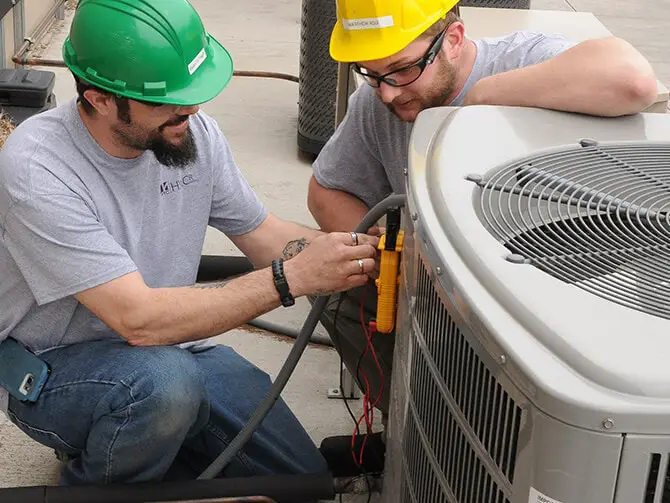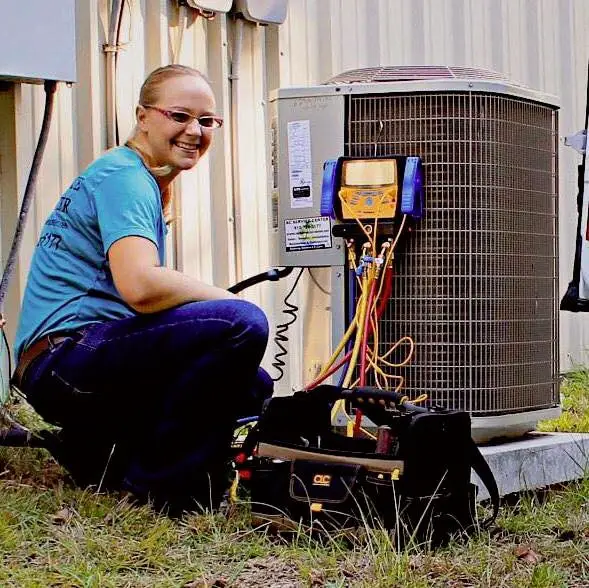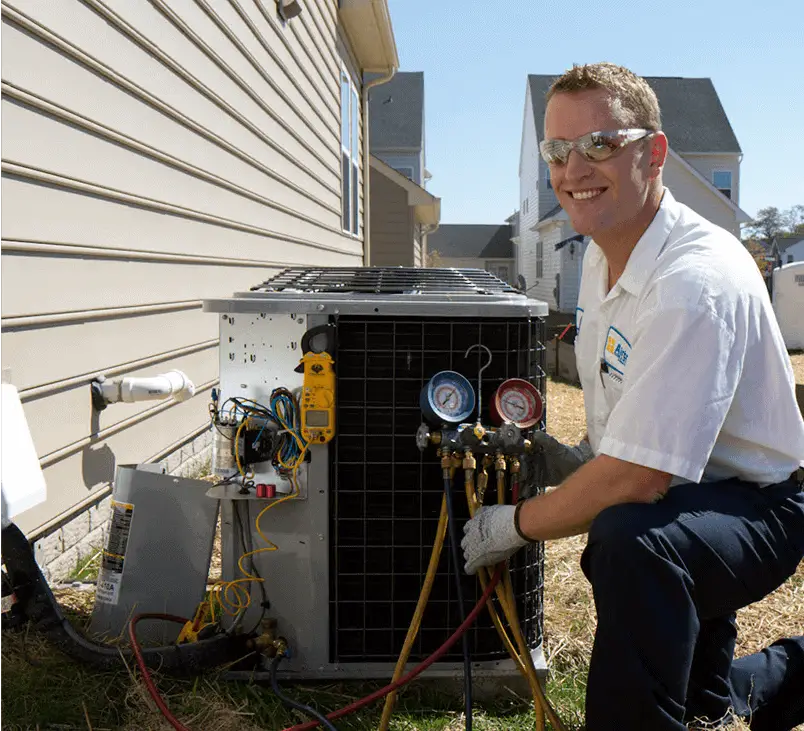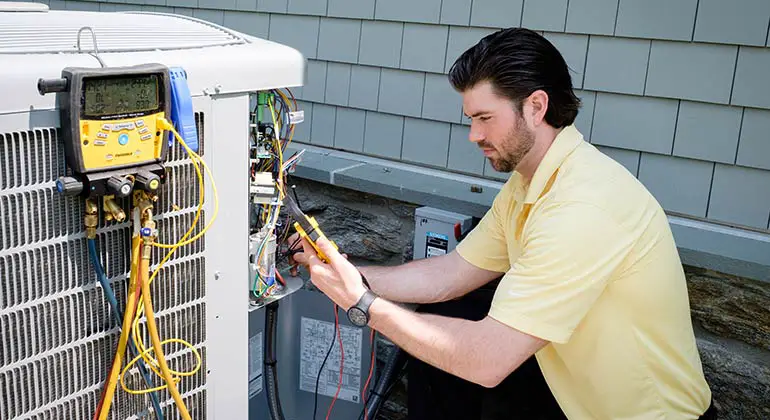If you are interested in becoming an HVAC technician in Arkansas, now might be the best time to jump on it. HVAC is a rapidly growing field in Arkansas with projected job growth of 16% over the next 10 years and has a high return-on-investment rate with ample career opportunities.
While there is an increase in demand for HVAC technicians in most states, the demand for HVAC technicians is soaring in Arkansas, where climate control is a big issue. This is because 70% of the state’s HVAC systems have an inadequate airflow and need to be fixed. In this article, we will discuss the path to becoming an HVAC technician, including HVAC training, licensing, and certification in Arkansas.

What Makes Arkansas a Great Place to Start an HVAC Career?
Arkansas is an excellent place to start your HVAC career due to a lot of reasons. Let’s discuss why Arkansas is a great place for HVAC technicians.
Monetary Benefits
The average hourly wage of a technician in Arkansas is $17.01, which is good enough and higher than what it is offered in most states. The minimum wage is $10.21, and a maximum of $26.80. The median annual wage rate of a technician will be around $35,380.
Growth
The salary and other benefits for technicians are pretty high in Arkansas. Based on this, the growth level in this field is quite good too. There is a higher probability of a technician to start his own business in Arkansas.
License
The word ‘license’ is quite complicated. Even if you have a degree in some particular field, most cities and states demand a license to start working. However, the case is different in Arkansas — there’s no need for a technician to obtain a permit.
But, if you are a contractor, you need to get a business license.
Exam Preparation in Arkansas
There is a proper process of exams and exam preparation in Arkansas. On behalf of the Arkansas HVAC/R Licensing Board, the examinations are taken by the ICC (International Code Council).
The permission from the board is mandatory before sitting in the exam. Once the applicant gets approval, they either apply for the computer-based test or a paper and pencil (P&P) test.

Becoming an HVAC Technician in Arkansas – What You Need to Know
Becoming an HVAC technician demands the fulfillment of certain requirements. You can go to Arkansas and start working as an HVAC technician or a contractor. There is a whole procedure to follow to become a technician in the state.
Apart from the licensing process, there are specific criteria about the examination as well. Below are the necessary details that you need to know.
Licensing
First of all, when thinking of becoming an HVAC technician in Arkansas, you need to see the license eligibility. The good news is, there are no requirements for the license—if you are 18 years or older, you can apply for the examination to get the permit.
Examination
If you have an educational certificate from an HVAC/R program, you can easily apply for certification. You have an option to choose between a traditional and a computer-based test. However, if you do not have a certificate, you need to have an on-the-job training certificate. You cannot just apply for the examination without the above two requirements.
Registration

Once you are done with the above two steps, you can work under a contractor’s supervision. However, you need to register yourself through the Department of Health. As long as you are associated with a contractor, you must pay an annual fee of $24 to the department.
Necessary Certifications
In Arkansas, new HVAC technicians are not mandated to have a license, but you might want to apply for one in order to further advance your career. There are six classes of licensing available through the Licensing Board, ranging from air conditioning systems to refrigeration. HVAC technicians must renew their license annually.
To qualify for Class A, B, C, D, and E license, one must be at least 18 years old and pass required examination. Two years of relevant work experience is also necessary.
Also, if you wish to work with or dispose of refrigerants, you are required to have the EPA Section 608 certification.
How to Obtain HVAC License in Arkansas
Obtaining an HVAC license in Arkansas is not as difficult as it might seem. However, there is an age limit. You must be at least or over 18 years of age to apply for the examination.
Moreover, you cannot just apply for the exam randomly. You need to have on-the-job training or an educational certificate from the HVAC/R program.
If you are applying through an educational certification, you must have on-the-job training approved by the Arkansas Department of Health. Besides, the state will review the educational transcript and will approve or reject the application.
How to Study For the Arkansas HVAC B License
The test is taken at authorized testing centers of ICC. It is an open-book test and consists of multiple-choice questions. The Arkansas HVAC/R Class B exam consists of 50 questions, and the time duration for the exam is three hours. Also, the license fee is $150 per year.
Job Outlook and Salary for HVAC in Arkansas
If we talk about the average salary for an HVAC technician in Arkansas, one can earn up to $38,193 per year. Additionally, if we include the average amount of over-time, a technician can add $6,562 per year to that total.
Entry Level
If we go by the entry-level, a technician does not earn much in starting days, given the experience and skills. However, one can easily make up to $11.62 per hour and $24,179 per year, excluding the over-time.

Mid-Level
There can be a mid-level technician and a junior-level technician. However, a junior technician can earn up to $14.4 per hour and $30,025 per year. Meanwhile, a mid-level technician can easily get $18.36 per hour and $38,193 per year. In fact, a mid-level technician is also eligible for overtime.
Master-Level
If you are a master or top-level technician in Arkansas, you can easily earn well. A senior-level technician begins earning at $23.36 per hour and $48,482 per year. Moreover, a master-level technician makes up to $29.00 per hour and $60,329 per year.
Insurance and Tax Information for HVAC in Arkansas
When you are applying for work in any place, you must have proper knowledge of everything, especially about the insurance and tax information. When it comes to HVAC technicians in Arkansas, the tax-related information is easy to understand.
The sales tax for contractors is around 6.5% of the total receipts generated from the revenue of tangible personal property and services. Moreover, the tax will include gas, water, electricity, telephone, and repair services.
Repair and the majority of the replacement parts for manufacturing machinery are taxable.
HVAC Training in Arkansas
Once you’ve decided to make the leap and become an HVAC technician, you would most likely benefit from some training in the field. This would help in making a smooth career transition, as many schools require students to obtain HVAC certification in Arkansas in the process.
When you attend an HVAC training school, you learn about HVAC equipment and how to diagnose and troubleshoot problems; how to repair, replace defective components and equipment or wiring; and carry out preventative inspections and maintenance on HVAC equipment. There is more to be learned about the topic such as electrical theory and psychometrics, but we will discuss the most prevalent topics, as course topics are prone to change depending on the school of your choice.
Some common topics include duct leakage testing, residential heat loads, pressure enthalpy, combustion analysis and fuel efficiency, hydrocarbon refrigerants, best refrigeration and charging procedure, residential energy auditor, and EPA Section 608 and EPA Section 609.
You’ll study in accordance with Partnership for Air conditioning, Heating, Refrigeration Accreditation (PAHRA) and their standards. PAHRA is an independent organization that accredits programs that meet or exceed industry-validated standards, so you might want to keep this in mind when looking for an HVAC program in Arkansas.
Top Arkansas HVAC Schools
One of the many schools in you could attend to get HVAC training in Arkansas is the Arkansas State University in Searcy, which offers a 34 credit hour technical certification in air conditioning technology. This certification program focuses on providing training regarding installation and servicing of central air conditioning systems and various refrigeration equipment.

Some of the topics taught in this course include gas heating systems, electric circuits and controls, air distribution, air conditioning and refrigeration components, and introduction to general electronics. The upfront cost for this course is $5,200.
Another viable option is the Arkansas Tech University in Ozark. The school offers a 36 credit hour technical certificate in air conditioning and refrigeration and a 60 credit hour associates in applied science in general technology with an option in air condition and refrigeration. Students are required to have competency in HVAC Excellence Exam before they graduate, and are mandated to take the EPA Certification Test. The cost for this program runs from $113 and $215 per credit hour.
What is the Difference Between HVAC A, B, And C Requirements in Arkansas?
If you come to think of it, the procedure of Arkansas certification is not complicated at all. One needs to keep the focus on applying either for a technician or contractor. Moreover, there are types of licenses, and each license comes with some advantages.
All licenses are not the same; they come with different permissions, requirements, and guidelines.
When it comes to similarities between the three types, one thing is common; working with HVAC/R.
When it comes to the differences, in class A, the capacities of units you can work with are unlimited; you can work without limiting the horsepower and BTU. Meanwhile, licenses B and C have limitations on work.
In License B and C, you can only work with 1 million BTU and 15 tons of cooling capacity. Besides, License C cannot install any original heating, ventilation, air-conditioning, and refrigeration system.
They cannot replace any existing part of the equipment. And finally, license B cannot service HVAC/R equipment.

Conclusion
HVAC is an ever-growing field in Arkansas with high job growth and tons of opportunities for a successful career, even in a weak economy. In this article, we discussed the possibilities that becoming an HVAC technician may be able to open up for you, including where to get HVAC certification in Arkansas.
If you are interested in starting a career in the field of HVAC, we recommend starting out with HVAC training and getting HVAC licensing in Arkansas for credibility.
People Also Ask
Even when you have a degree and all the necessary certifications, you might still be confused. Getting an HVAC certification in Arkansas raises many questions, and unanswered queries create trouble for the contractor and technician both. Here are answers to some common issues:
There is no fixed duration of becoming a certified HVAC technician in Arkansas. You can apply for the examination only if you are 18 years old. You also must have at least two years of experience. In case of an educational certificate, you need on-the-job training approved by the Arkansas Department of Health.
Well, it depends upon what you want to do with your degree. The most common paths people follow are work as a technician or start their own HVAC business as a contractor.
Once you are 18 years old, you can apply for the HVAC examination. After getting done with the exam, you need to apply for a work-study program or an internship. With two years of experience and hands-on training, you will be eligible to get an HVAC card in Arkansas.
If you want to apply for an HVAC contractor’s license in Arkansas, you need to provide proof of workers’ and compensation coverage of any employee. Moreover, you need to deposit cash or a surety bond of at least $10,000. Besides, a class A or B HVAC/R license is mandatory.
You must obtain formal permission from the board before applying for the examination. ICC conducts examinations on behalf of the Arkansas HVAC/R Licensing Board. You can either apply for CBT or P&P test. The tests are taken at an authorized ICC test center.
No, an HVAC certified is not the same as an EPA universal certified. To get an EPA (Environmental Protection Agency’s) certification, you will need your HVAC/R certificate. EPA certificate helps in handling the controlled refrigerant systems. Besides, you can get your EPA universal certificate from the HVAC program as well.
Looking For Information On Nearby States?
You might also be interested in HVAC licensing requirements in bordering states:
